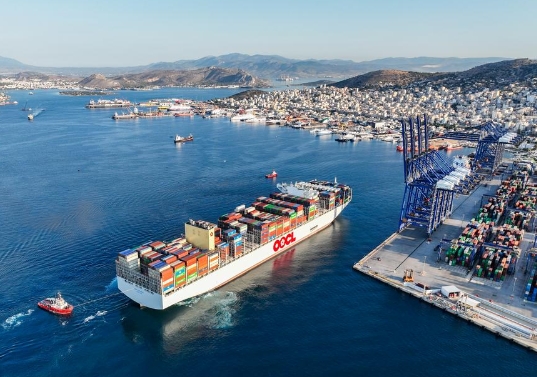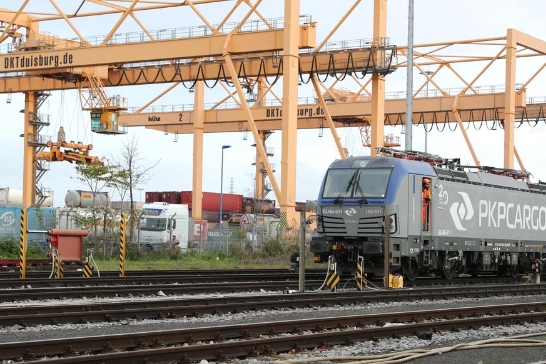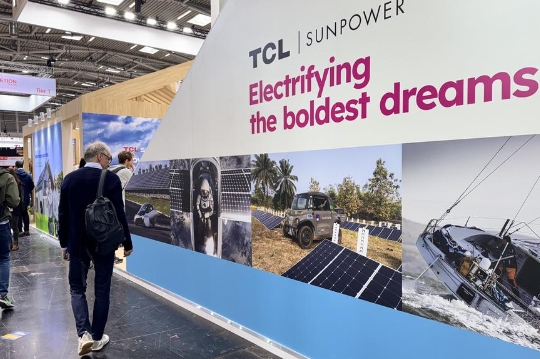Swedish businesses eye deeper cooperation with China as EU-China ties turn 50

This aerial photo taken on July 10, 2023 shows OOCL PIRAEUS, one of the largest container vessels in the world, about to dock at Piraeus port in Piraeus, Greece. (Xinhua)
Among the various areas of EU-China economic cooperation, experts have identified green development as a particularly promising focus.
As the European Union (EU) and China mark 50 years of diplomatic ties, Swedish businesses are looking to deepen their engagement with the world's second-largest economy, with experts and business leaders calling for practical cooperation, especially on green development, to boost Europe's competitiveness amid global uncertainty.
"China is by far the most important market in Asia for Swedish companies," said Ulf Pehrsson, chairman of Sweden-China Trade Council (SCTC), in a recent interview with Xinhua.
Founded in 1980 by major Swedish firms operating in China, the SCTC has witnessed and taken part in the growing economic and trade exchanges between China and Europe over the past decades.
In 2024, bilateral trade between China and the EU reached 785.8 billion U.S. dollars, supporting an estimated 3 million local jobs, data showed. Against this backdrop of deepening economic ties, Pehrsson said SCTC members are closely following the outcomes of this year's EU-China summit held on July 24 in Beijing.
"At the moment, we feel that there is a new momentum in the Sweden-China trade and investment relationship," he said.

The 100,000th China-Europe freight train arrives at Duisburg Intermodal Terminal (DIT) in Duisburg, Germany, Dec. 3, 2024. (Xinhua/Du Zheyu)
Among the various areas of economic cooperation, experts have identified green development as a particularly promising focus.
The establishment of a China-Sweden working group on green transition investment earlier this year was widely viewed as both strategic and timely, as Europe is working towards its ambitious goal of 42.5 percent of renewable energy of total energy consumption by 2030.
Hussein Askary, vice chairman of the Belt and Road Institute in Sweden, said that sectors like clean energy, where China has clear competitive advantages, should be regarded as opportunities for collaboration between the EU and China rather than competition.
Askary cited the collapse of Swedish battery startup Northvolt as a case in point. "Just one year into operation, the venture, which cost Sweden and the EU billions of euros, went bankrupt. That proves the 'de-risking' narrative does not work in practice," he said.
This view is also supported by a growing number of joint clean energy projects across Europe. In Germany, the Dollen Solar Park, and in Greece, the Thrace Wind Power Project have both leveraged Chinese technology to reduce dependence on fossil fuels.

This photo taken with a mobile phone on May 7, 2025 shows a visitor visiting TCL booth during 2025 Intersolar Europe exhibition in Munich, Germany. (Xinhua/Huang Yan)
Within Sweden's own energy landscape, a notable example is the partnership between local firm SaltX Technologies and Chinese manufacturer NSECT to commercialize a solar thermal storage system, SunCool, now produced at scale in eastern China. The project contributes to Sweden's green transition by offering an innovative solution for clean heating and cooling.
Rather than disengagement, Askary emphasized the need to build on complementary strengths across regions. He noted that while China leads in clean technology, Sweden retains a competitive edge in sectors such as biotechnology, and many Chinese firms are actively seeking collaboration.
"That's the win-win formula Europe needs," rather than pursuing protectionist approaches seen in certain advanced economies that advocate decoupling and trade barriers under the guise of national security, he added.
Editor:伏娅敏
